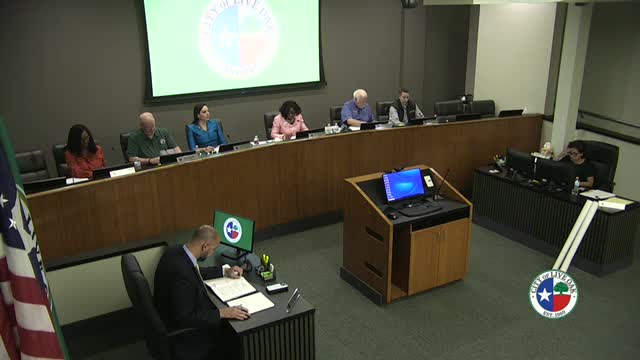Live Oak residents allege switch to fixed license-plate readers, cite Open Meetings Act concerns
Get AI-powered insights, summaries, and transcripts
Subscribe
Summary
Residents at Live Oak's Nov. 4 council meeting accused officials of switching an advertised vehicle-mounted license-plate reader project to standalone cameras without required public notice, and urged the council to halt the rollout pending review under the Texas Open Meetings Act.
At the Nov. 4 Live Oak City Council meeting, multiple residents told the council they believe the city changed an advertised plan for vehicle-mounted license-plate readers to a network of permanent, standalone Flock cameras without adequate public notice.
"Why did the city's Flock license plate reader program get adopted the same year as BB inspections contract…?" said Christina Lichtenberg, who identified herself as a Live Oak resident and business owner. Lichtenberg alleged the deputy fire marshal has used Flock data in code-enforcement actions and said a police report was filed with Live Oak Police Department naming council members, the city manager and the police chief for violating the Open Meetings Act.
Cecilia Lopez said staff refused to notarize a sworn complaint her mother sought to file against a council member, calling the refusal a "violation" of the right to petition government. "They both refused to help…She was told to just make an appointment," Lopez said, characterizing the refusal as a barrier to submitting a complaint.
Angela Mahadi, another resident, told the council the original public notice described five vehicle-mounted LPR units but the project later was presented as a network of standalone cameras. "The switch from 5 vehicle mounted units to a network of stand alone cameras is a significant change in the nature, cost and intrusiveness of the system," Mahadi said, arguing the change required additional public notice under the Texas Open Meetings Act.
The residents cited Texas open-meetings requirements and warned that knowingly participating in a meeting where an unposted subject is considered can be a misdemeanor under state law. The transcript of the meeting records references to the Texas Open Meetings Act and to Texas Government Code provisions governing executive-session consultation with attorneys and deliberation regarding security devices (the council subsequently met in executive session under cited Government Code sections for related items).
Council did not announce a reversal or suspension of the Flock contract during the public portion of the meeting. The council moved the security-devices item into an executive session under Texas Government Code section 551.076 (deliberations regarding security devices). After reconvening, the council recorded that no action was taken on that security-devices item.
Residents' allegations and the recorded executive-session disposition leave the central claims unresolved in the meeting record: the council did not vote on rescinding or altering the LPR deployment, and no staff statement in the public record rebutted the claim that the agenda had been changed without required notice.
What happens next: the meeting minutes and any follow-up materials (including the police report referenced by a resident) will be the primary documentary sources for any legal or administrative review. The council did appoint an independent outside attorney to serve as an ethics compliance officer during the same meeting (see separate council actions), but the public comments about the Flock system were not resolved by a formal council vote.
